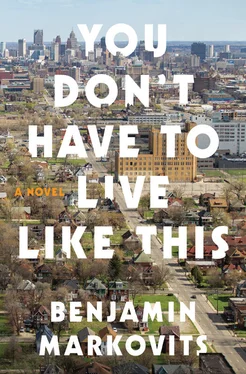I shook my head at her. “I don’t know.”
Ernst left her, she said, for no other reason than that everything about them had become too unhappy. I’m not unhappy, she told him. Something terrible has happened to me but I’m dealing with it. (I liked it when she used American slang.) He said to her, Come with me, let’s go home, I’ve had enough of this country, but she felt that America was just becoming interesting. She was becoming interested in herself — she was discovering new things. Also, they argued about sex. Already a few weeks after the rape she wanted to prove to herself, and Ernst, that she could be normal and okay about sex, but in fact, she admits now, she was a little crazy in this respect, and Ernst understood very well that she didn’t want to be touched. But this is how she interpreted it, that he didn’t want to touch her, and she accused him of stupid things, she said he didn’t want to put himself where a black man had been, that she was stained and dirty and ruined, a ruined woman, that this was how he saw her. All of which upset Ernst very much, he was in tears, and somewhat pathetically tried to stroke her. But it wasn’t just pathetic, he couldn’t help himself, it was all too deliberate and unnatural, a little forced, and again she felt this childish feeling, that he was stronger than her, and when she pulled away in reaction, she had never seen him so angry before.
Why do you make that face, she asked me.
“I’m beginning to feel a little sorry for Ernst.”
“I feel sorry for him, too. When you saw me that night”—she meant at Bill Russo’s place in the country—“I was still a little crazy with everything that had happened. But you were smart. You ran away from me.”
“I didn’t run away. There were people I needed to talk to.”
“No, I know when a boy runs away from me.”
“Did they find the man who — raped you?”
“They found the car, and there were his fingerprints in the car, and they know who he is, but they haven’t found him.”
“But they found his sister?”
“Yes. I saw her again.”
“What did you say to her?”
“I can show you one day. I filmed it.”
For some reason, she hadn’t brought her video camera to the party. But often, when I saw her afterwards, she had it along: a small black Kodak, which she wore around her neck like sunglasses. It took some getting used to. I found myself talking and acting unnaturally and hated watching the results. My voice sounded funny to me, which is what everybody says, more southern than it sounds in my head, and kind of complaining or sarcastic or gay. In the beginning, I often stared into the camera, which Astrid told me not to do, but I couldn’t help myself.
Not that night but later I agreed to let myself be filmed having sex with her, which I came to regret. It started bouncing around the Internet at a bad moment, before the trial, when there was already a lot of media interest in my name. I learned firsthand the way private acts become distorted if they are shown in public. Because in fact it was a very tender scene. This was the first time Astrid had had sex since being raped, which is why she wanted to record it. We were extremely gentle with each other, and it wasn’t so much about pleasure as about getting through it, though of course there was pleasure, too, especially on my side. She cried much of the time but also held on to me and in her own way seemed pretty insistent. But it didn’t look good, and the sound quality was poor, which made it difficult to hear what she was saying. We filmed it at my bedroom in Johanna Street, and the way people took it was, this is the kind of thing they got up to there. But it didn’t really have any bearing on the case.
Kettridge High is more or less on I-94, about thirty blocks north of Johanna Street. You can hear the traffic clearly as you walk up to the school entrance, and even inside there’s a hum that isn’t just kids. There was a security check inside the door, with one of those metal-detector portals. I passed through it minus keys and wallet, which I collected again on the other side. The guard wore a uniform that looked like a police uniform but cheaper, and he had a gun on a cord attached to his belt. He was sitting on a plastic cafeteria chair, and the table I pushed my wallet and keys across was a cafeteria table — a high school’s makeshift version of airport security.
The guard was black, the secretary in reception (who I could see through a window in the office door) was black, and the kids I saw making their way to lunch were black. I shouldn’t have been surprised, in fact, I wasn’t surprised, which didn’t stop me feeling like I’d entered another country, after an airplane flight.
Gloria had told me to come to her homeroom and the woman in the office gave me directions. The school itself looked like the school I went to in Baton Rouge, both inside and out—1960s architecture, one-story, with a couple of columns holding up the entrance and yellow brick siding. The hallways had stippled partition walls and glossy floor tiles; everything echoed.
When I reached her room, Gloria was talking to a kid, so I waited by the open door. The kid had to bend his neck to look at her, though he also had a backpack over one shoulder, which seemed to pull him down. He was about twice her size, with a kid’s mustache and his hair cut back in rows. Gloria stood up straight, with her feet together; I wondered if she used to dance. She wore high socks and plain blue shoes, a skirt and a buttoned shirt — the prim schoolgirl look, which for some reason looks flirty on women.
“Come on in, Greg,” she said, when she saw me. “This is Alonzo. He’s one of the good ones. He’s one of the ones that makes it all worthwhile. Greg is thinking about becoming a teacher.”
“I didn’t want to interrupt you.”
“Nah, I was going,” Alonzo said. And then: “So you got somethin’ to teach me?”
“I don’t know. A little history.”
“Not too much, huh?” he said.
“Does he have a crush on you?” I asked, after he closed the door.
“I hope so,” she said, but shook her head. “It’s easier if they want me to like them.”
“I’m sure everybody wants that. So what makes Alonzo one of the good ones?”
“Oh, I say that to all the kids,” she said.
The classroom windows overlooked the school parking lot, which had all kinds of cars in it, including some expensive-looking SUVs, with tinted windows, and much cheaper cars, with smooth treads and rusty hoods.
“I haven’t been inside a high school in about fifteen years. I always tried to sit next to the window. There was a gas station just off campus, and I used to watch people filling up. They filled up and they drove off, all these grown-ups. I was jealous, because they could go where they wanted, and nobody bothered them. We went there, too, during lunch break, for potato chips and soda.”
“Well, I’m a grown-up and I’m stuck here. Let me show you one of our projects,” she said.
The classroom walls were covered in bright pictures, colored in by felt-tip or Magic Marker and pinned up with thumbtacks. Then I noticed that some of the pictures were photographs, computer printouts of digital images, done on the same white paper.
“This is something Nolan worked with me on,” Gloria said. “It’s ongoing. They keep bringing in new stuff. We call it I See What I See . He got Nikon to donate some cheap digital cameras, the kind you give kids. We told them to take a lot of pictures of stuff in their lives. Then we ask them to draw whatever they took a picture of. Mostly they try to make the drawings as close to the photographs as they can, because it’s easier, which is fine, but that’s not really the point.”
Читать дальше












